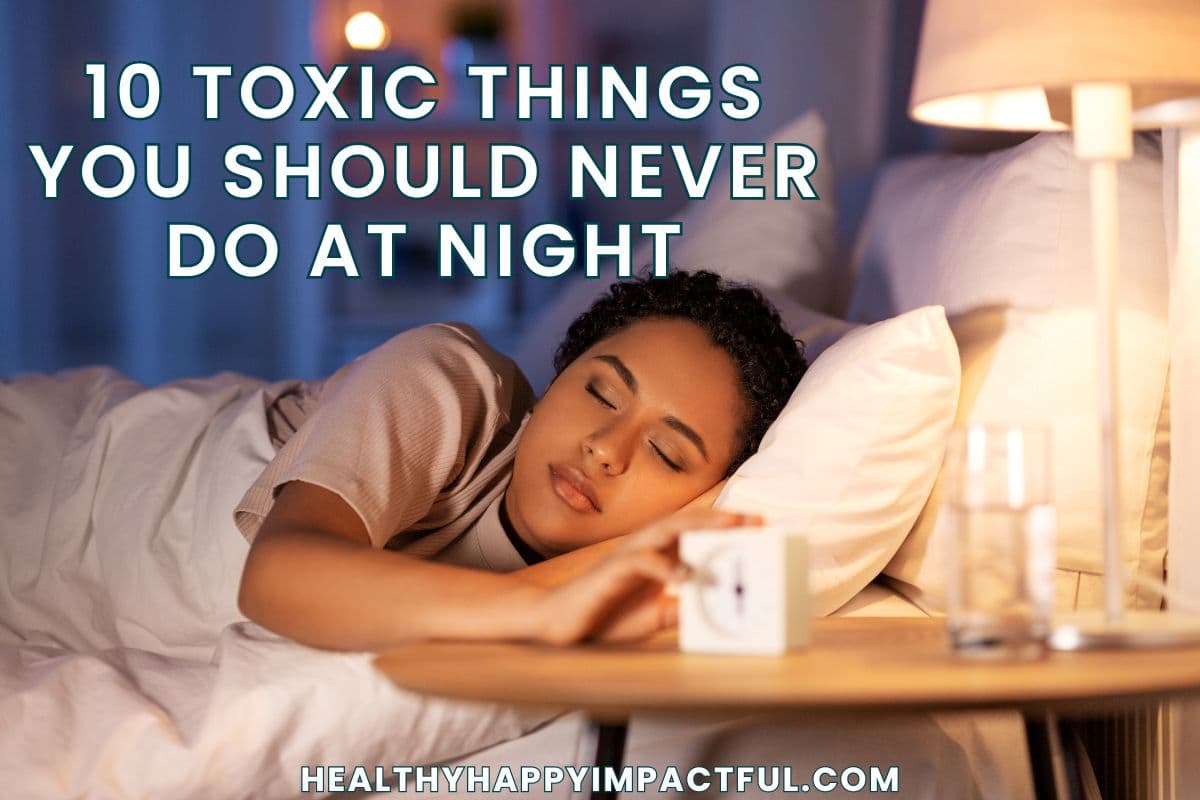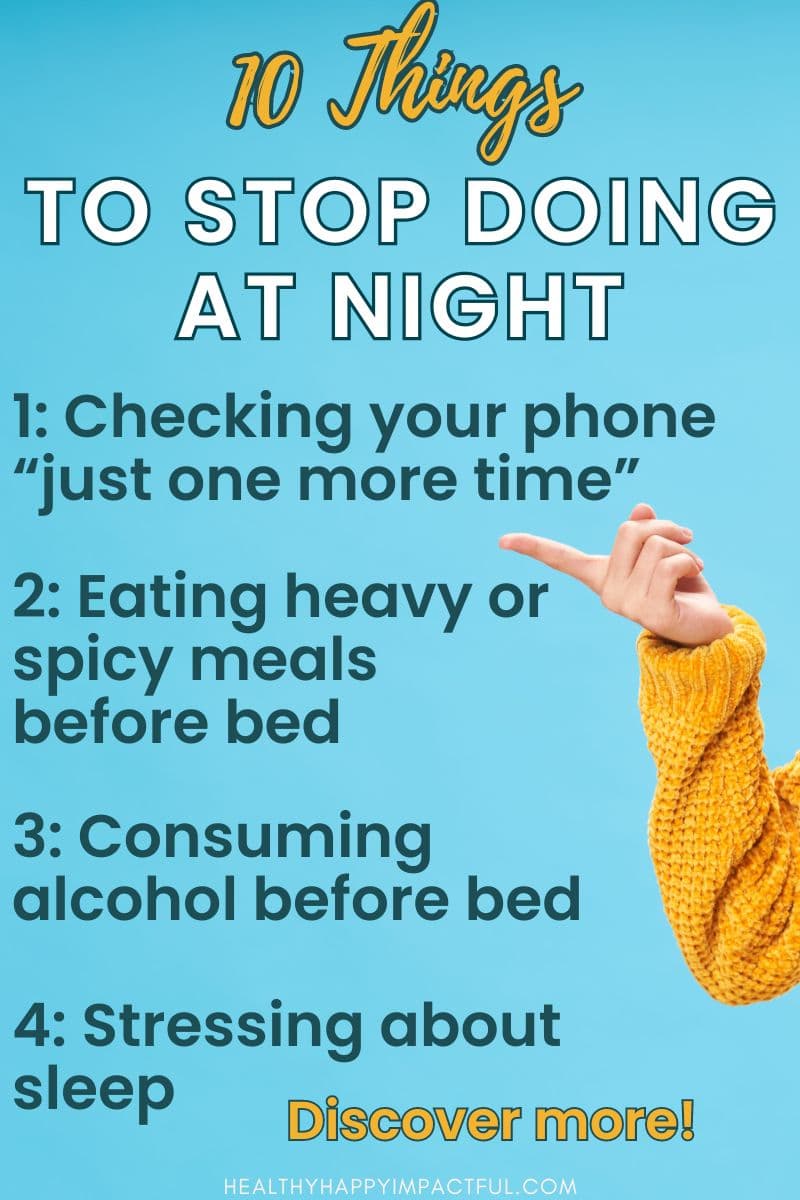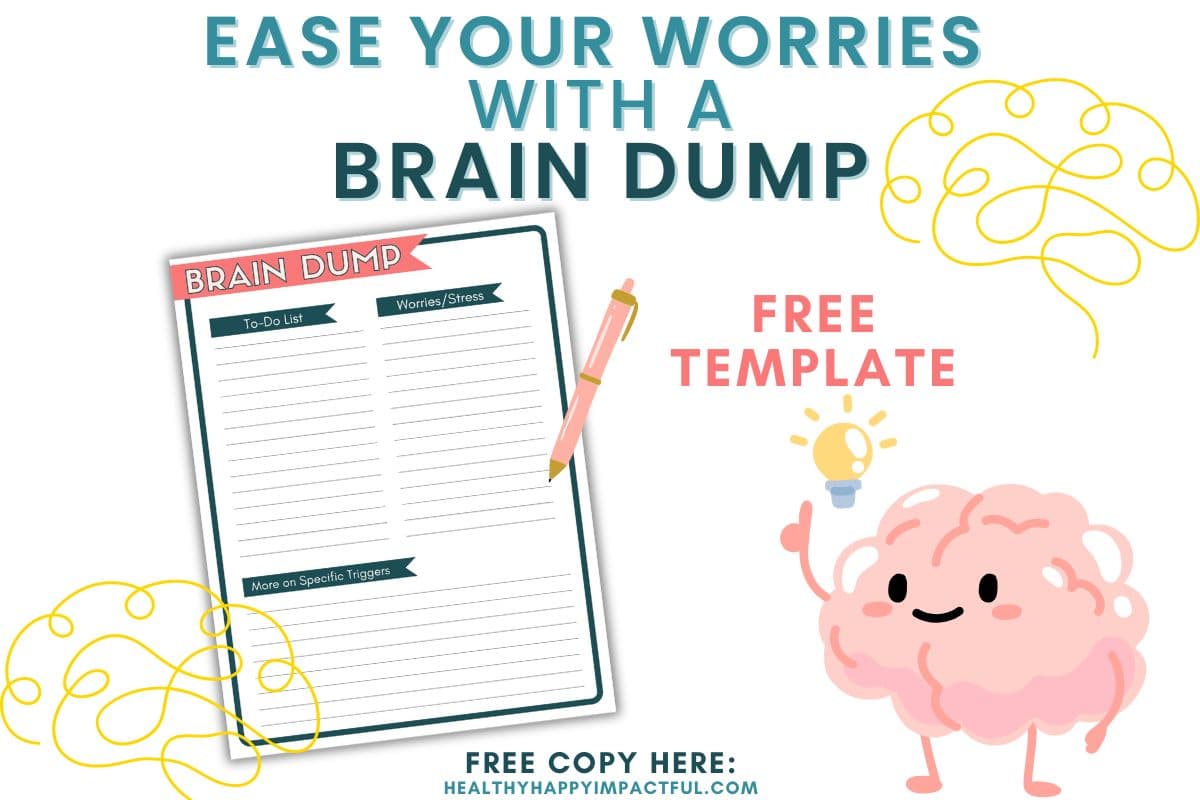10 Toxic Things You Should Never Do at Night
At the end of last year, I was feeling anxious and losing sleep. It became almost impossible to disconnect from work and mom mode at night.
I knew that my computer and phone were the main culprits. But there were other problems too.

So, I made a few small changes. I stopped doing the toxic things at night that were getting in the way. And they’ve made a surprisingly MASSIVE impact on my mental health.
The great news is that it wasn’t hard. You can do these things even if your nights are currently a mess.
Plus, consider the difference in how you feel after just 5 days of good sleep. Now multiply it to 5 years. You’ll look, think, and feel like a different person over time. It’s critical to start now!
10 Bad Night Habits to Give Up Now

Would you like to save this idea?
Key Takeaway: Don’t ignore wind-down time! Going straight from a busy day to bed without a calming routine can make it difficult to transition into sleep mode.
1. Perusing Your Phone for Just One More Minute
We all know what it’s like. You check one more thing on your phone only to look up 45 minutes later. It’s so easy to get sucked in.
Unfortunately, the blue light from phones, tablets, and computers can interfere with your body’s ability to wind down. Plus, you’re losing sleep just by staying up later than you intended.
Action Plan: Try a 30 day challenge of turning your phone off 1 hour before bed. Or use the Freedom App to block you from temptation at this time. Instead use the time to read, journal, or cuddle with loved ones. And if social media is a problem for you, try a social media detox.
2. Eating Heavy or Spicy Meals
Eating rich or spicy foods before bed can make sleep uncomfortable and even cause indigestion.
Action Plan: Eat your heaviest and spiciest meals toward the middle of the day.
3. Consuming Alcohol Before Bed
While alcohol may make you feel drowsy, it can disrupt your sleep cycle and lead to poor-quality rest. You can also wake up the next morning with a much worse hangover if you crash without hydrating.
Action Plan: Aim to stop drinking 2 hours before bed. Give your body a chance to rebound and sleep soundly.
4. Stressing About Sleep
Worrying about not getting enough sleep can create anxiety and make it even harder to drift off.

Action Plan: Try this mind dump template to get your worries out of your head and down on paper. I also find that it helps to use sleep affirmations and turn my alarm clock around. That way I can’t keep track of how long I’ve been awake.
Having peace, happiness, and healthiness is my definition of beauty. And you can’t have any of that without sleep.
— Beyoncé
5. Doing Stimulating Things Before Bed
The hour before bedtime should be a wind-down that tells your body to chill out for the day.
Be careful not to:
- Exercise intensely. It can delay sleep because you’ve boosted your energy instead
- Have intense or argumentative conversations
- Watch action-packed tv shows and scary movies
Anything that gets your adrenaline going will make you too anxious to sleep!
Action Plan: Save the high-intensity stuff for morning and afternoon. At night, opt for light-hearted comedies that make you laugh, strolls in nature, and leisure time.
6. Drinking Caffeine Late in the Day
Caffeine can stay in your system for hours, making it harder to fall asleep.

Action Plan: Pay attention to your body and how you sleep after drinking caffeine. For me, 3:00pm is the cutoff, and I know my body won’t be affected before that time. But yours could be sooner or later.
7. Using Your Bed to Work
Generally, you want your bedroom to be only for sleep. When your brain associates your bed with work, you’ll find it much harder to shut down at night.
Action Plan: Get work out of your bed. Get it out of your entire bedroom if you can. I moved my desk out of my bedroom. And covered our television. Now, the room tells me it’s time for sleep instead of “what about one more thing?”
8. Not Having a Consistent Bedtime
If you go to bed at 9 pm some days and 12 am on others, your body’s internal clock will find it hard to fall asleep consistently.
Action Plan: Stay within an hour of the same bedtime every (or most) days of the week.
9. Ignoring The Role Your Environment Plays

If your bedroom is warm and your lights are bright, you are doing your body a disservice. Loud noises, outdoor lights, and terrible bedding also impact sleep more than you might think.
Action Plan:
- Set your thermostat to 65-68 degrees at night
- Dim your lights an hour before bed. Turn them off completely at bedtime
- Buy a white noise machine and blackout curtains if you need to.
- And pay attention to your bedding and pillows too.
Ask yourself: Does your environment invite good sleep?
10. Letting Middle of the Night Disruptions Derail Your Sleep
I can’t count the number of times I’ve wanted to kick my husband out of bed for forgetting to turn his notifications off. 3 am phone wakeups over nothing are infuriating!
Action Plan: Make sure phone notifications are off. And consider anything else that might be disrupting sleep in the middle of the night:
- Are the kids getting up? Can you make a plan to help them stay in their rooms or have your partner help some of the time?
- What about pets? Do they need to sleep elsewhere?
- Do you get up to pee often? Establish a cutoff time for drinking water.
Sleep is an investment in the energy you need to be effective tomorrow.
— Tom Roth
What’s Next?
First, write down one thing you can stop doing tonight!
Next, check out the best night routine tips and amazing things to do at night. Then, sign up for the Family Connections Newsletter. You’ll receive the best family connection and routine content sent straight to your inbox!

